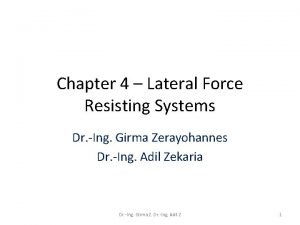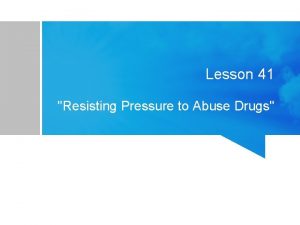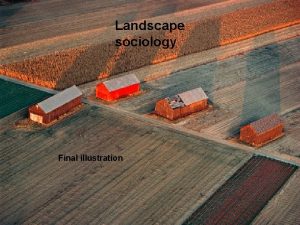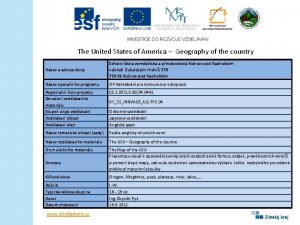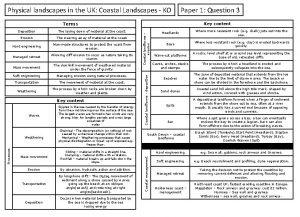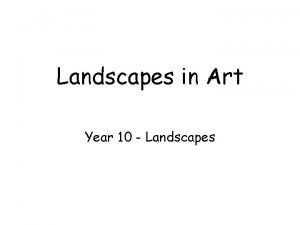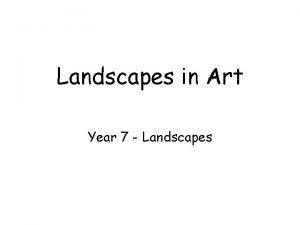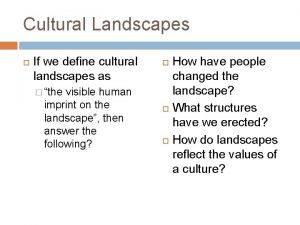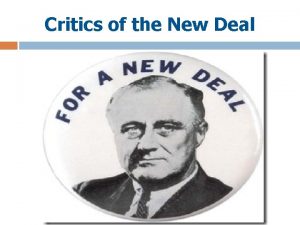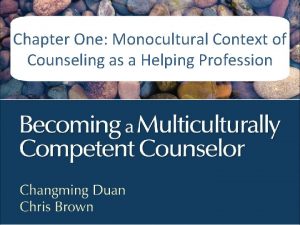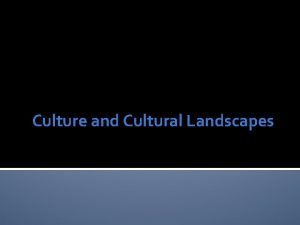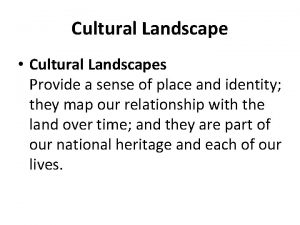Young People as Cultural Critics Resisting MonoCultural Landscapes












- Slides: 12

Young People as Cultural Critics: Resisting Mono-Cultural Landscapes Dr Rick Bowler Dr Amina Razak

The Research- Phase 1 Survey of Young YAV members Interview with Project Manager Focus group with Paid staff and volunteers Focus group with Young Women ‘VIP’ Group

Our Main Arguments Young Asian Voices (YAV) have clearly helped their young members develop profoundly moving and deeply critical readings of the world. The young women’s resistance to the everyday racisms they experience in the mono-cultural landscapes of post Brexit Northern England illuminate their roles as cultural critics and convivial bridge builders. These young women and YAV as a youth project should be listened to by all policy makers in the region.

Context and Complexity ‘Racism is a slippery subject, one which evades confrontation, yet one which overshadows every aspect of our lives…’ (Aveling, 2002: 119) Whiteness is ‘the unmarked and ‘raceless’ body politic of the nation’ (Randell. Moon, 2012: 1) ‘The context for youth work in contemporary times, particularly in Northern England, is a brutalised one’ (Hughes et al, 2014: 3)

What’s ‘resisting mono-cultural landscapes’ got to do with Hate Crime? Race hate crime in North East soars to record levels in post Brexit period: Incidents in Northumbria force area up 48% in three months after EU referendum compared to same period before vote (Kelly, 2017) “I was like at the bus stop. Right. And there was a boy with this bike. I don’t know. Like our age. He grabbed on my scarf and tried to pull it”

What’s this got to do with Hate Crime? Perpetrator ACTIVISM AGENCY Victim

Focus group discussions • Interviewer: ‘What do you mean by sharing culture? ’ YP 1: ‘I work at the hospital and none of them knew about me and I’m the only Asian so they ask me a lot of questions. They are unaware of like […] Islam or about our culture […] in general’ YP 2: ‘Yeh, same in my placement. They don’t know like about Eid and Ramadan’ YP 1: ‘or why I am wearing a headscarf or something’ YP 3: ‘basic knowledge like that’ • Interviewer: Just when you are on placement YP 2: Yeh, even in college YW 3: ‘why do you wear that scarf around your head – those questions – do you sleep with it (A lot of laughter from the group) YP 2: ‘they don’t even know like, about halal – like, the difference’ • Interviewer: Other white students? YP 2: ‘yeh […] and quite a lot of staff don’t know either YP 2: ‘I was asked if I was Hindu or Bengali and then the question was, what is Hinduism and what is. . ’ YP 4: ‘You can be Bengali and Hindu’ YP 3: ‘they think it is an ethnicity’ YP 2: and then there was questions on both of them and they had no knowledge of both’ Interviewer: do you feel comfortable with the questions you are asked? YP 4: ‘religion sometimes gets like Ahhhh! (she makes a face of disgust) YP 5: ‘because they ask it rudely’

Focus group discussions • Interviewer: What do you mean rudely? YP 3: ‘have you ever had pork before, do you, how can you not eat bacon? , It’s just like YP 2: ‘how can you live without bacon. I like fish fingers (group laughter) YP 5: ‘The first thing they say is I’m not trying to be racist, that puts you on guard, you’d be like, what are they going to say? ’ • Interviewer: Have you ever felt the question has been racist in any way? Several YW: ‘Yeh’ • Interviewer: Can you give us some examples? YP 2: ‘do you sleep with it on’ (group laughter) YP 5: ‘do you shower with it’ • Interviewer: With your headscarf on? ALL YP: ‘Yeh’

Focus group discussions • Interviewer: So do you mean you know more about white British culture that they know about your culture? YW 4: ‘yeh that’s what I’m trying to say’ YP 2: they kind of make you question yourself. why don’t you wear a scarf. I’m like YP 3: so do you wear it all the time YP 4: do your parents make you wear it. do your parents press you YP 2: why does she wear it. why does she not YP 4: are you trying to rebel against your religion YP 2: why don’t you. does your mum not make you. I’ve seen girls around college that do. and then you have to kind of answer. why. where you really should. cos in our religion you should. you’re kind of like yeh you should but I don’t. it kind of makes you feel bad

Focus group discussions YP 3: ‘there’s not really like an area where I’m not scared. To be honest every area is scary for me’ YP 6: ‘go back to your country you Indians. He [white man] was walking away but he was looking back at us and shouting, wasn‘t he’ YP 8: ‘sometimes when you’re in groups it makes you feel better. You’re not alone. When you’re alone you actually physically feel scared’ YP 5: ‘sometimes you feel that they [white people] might attack you’ • interviewer: so how does this kind of affect how you travel, where you go? YP 9: ‘for example when I’m in my Asian areas I feel safer. […] YP 10: ‘cos your comfortable on your street but like, say I went on your street [a predominantly white area where one of her peers lives] I would feel scared […] cos I know there’s more chance of a guy walking past, or a girl and making a racist comment’. YP 11: ‘yeh, do you know at work the other week this old woman came in and she refused, she wouldn’t let me serve her. She said she didn’t want to be served by me […] I had my head scarf on […] as I was serving her she goes, don’t touch my stuff’ YP 6: ‘I was waiting for my brother to pick me up, just outside of college, some guy drives past and he shouts’ Oi you dirty paki terrorist and he drives past. And I’m like OK! At least stop (group laughter) YP 11: ‘one white guy, he jumped down the hill and then punched my dad twice. And then a couple of Bengali lads were coming around the corner. And then he just ran off. My dad didn’t call the police. What are they going to do? We were all really annoyed. He should have rung [the police] but then again they’re not going to do anything’

Conviviality The young women at the heart of this talk and at the forefront of the work of YAV articulate an approach to ‘Britishness’ that is convivial. Their desire for intercultural and inter-faith dialogue across the social divides in their City needs resourcing. The young women know how their lives have been formed by British ‘White’ and ‘Asian’ cultures but their white peers appear captured by the mono realities of white world knowledge. These mono-realities (re)produce ideas about identity that are essentialist. They block progress to intercultural possibility.

References • Cantle, T and Thomas, P. , (2014), ‘Taking the Think Project Forward - The Need for Preventative Anti-Extremism Educational Work’, Project Report. The Think Project, Swansea accessed at http: //eprints. hud. ac. uk/19790/1/Think_project_report. pdf Last accessed 9 th June 2017 • Edinburgh Youth Work Consortium and University of Edinburgh, (2015), ‘Universal Youth Work: A Critical Review’, Edinburgh Youth Work Consortium accessed at http: //www. layc. org. uk/wp-content/uploads/2015/05/Youth-work-literature-report-final-May-2015. pdf Last accessed 10 th June 2017 • Garner, S. , (2016), ‘The Moral Economy of Whiteness: four frames of racializing discourse’, London, Routledge • Hughes, G. , Cooper, C. , Gormally, S and Rippingale, J. , (2014), ‘The State of Youth Work in Austerity England – reclaiming the ability to ‘care’’, Youth and Policy, No. 113, November 2014: 1 -14 • Kelly, M. , (2017), ‘Race hate crime in North East soars to record levels in post Brexit period’ Evening Chronicle 15 th February 2017 accessed at http: //www. chroniclelive. co. uk/news/north-eastnews/race-hate-crime-north-east-12610616 • Oakley, R. , Isal, S and Woods, A. , (2011), ‘Are you saying I’m Racist? An evaluation of work to tackle racist violence in three areas of East London’, London, Runnymede Trust and Trust for London • Parekh, B. , (2000), ‘The Future of Multi-Ethnic Britain: The Parekh Report’, London, Profile Books • Pasha, Associates, (2008), ‘The Unity Programme: The Muslim Communities in Newcastle’ Salford, Salford Housing and Urban Studies Unit • Randell-Moon, H. , (2012), ‘Racial Legitimations and the Unbearable Whiteness of Being’, Australian Critical Race and Whiteness Studies Association (ACRAWSA), Vol. 8 2012 accessed at http: //www. acrawsa. org. au/files/ejournalfiles/editorials/54 CRWSRandell-Moon 2012. pdf Last accessed on the 9 th June 2017 • Riviere, D. , (2008), ‘Whiteness in/and education’, Race, Ethnicity and Education, Vol. 11, No. 4: 355368
 Central road fund 1929
Central road fund 1929 Lateral force resisting system
Lateral force resisting system Resisting temptation lds
Resisting temptation lds Resisting pressure to abuse drugs is a responsible .
Resisting pressure to abuse drugs is a responsible . What makes a landscape distinctive
What makes a landscape distinctive Enchanted definition
Enchanted definition Fpm landscapes
Fpm landscapes Region 5 themes of geography
Region 5 themes of geography Etnorami
Etnorami Define depositional landforms
Define depositional landforms Limestone landscapes
Limestone landscapes Morraine glacier
Morraine glacier Landscapes and landforms
Landscapes and landforms

